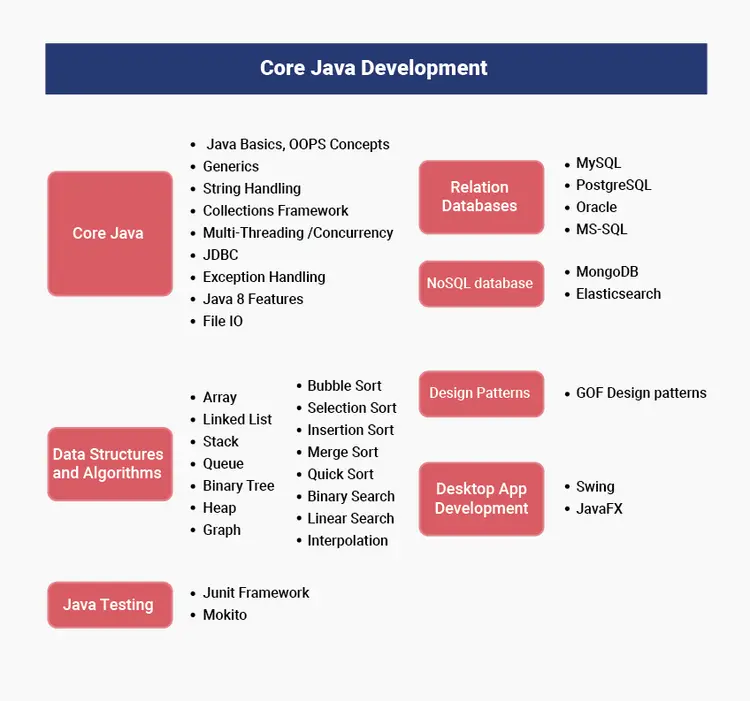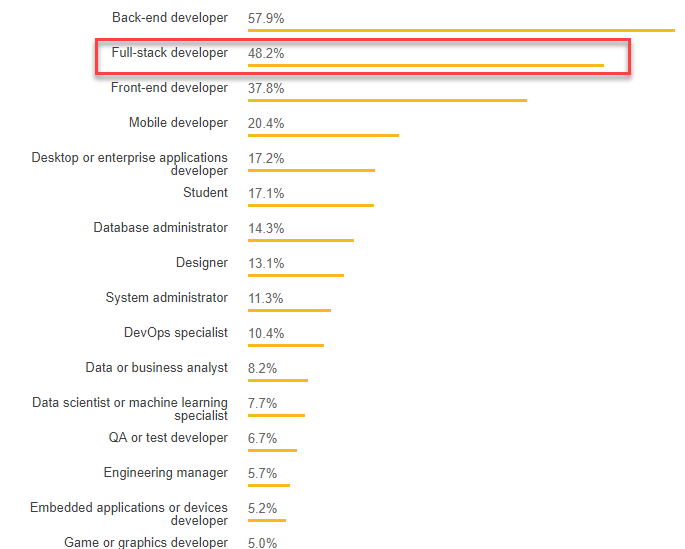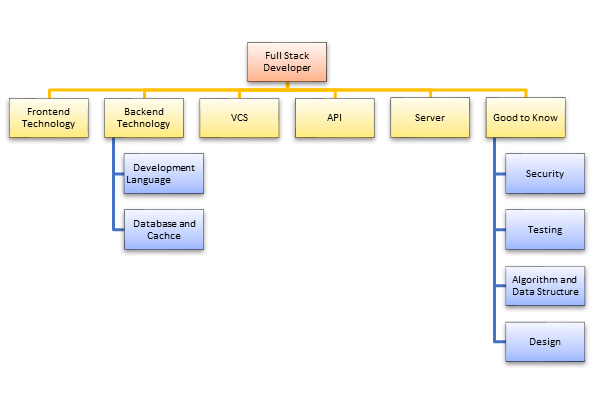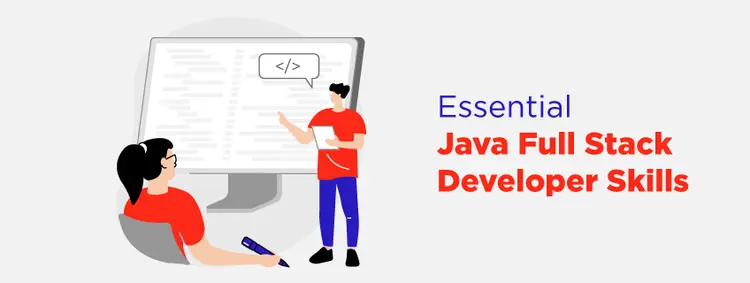Java Full Stack Developer Skills, as the language of digital technology, is one of the most popular and robust of all software programming languages. It is ideal for cross-platform applications because. It is a compiled language with object code that can work across more than one machine or processor. All programming is done using coding languages. Java, like Python or JavaScript, is a coding language that is highly in demand. Also, Java back end developer skills are wanted nowadays by the top companies. It is seeing its utility and application grow as businesses envisage growth in the market and operations within.
Java has become the go-to language for mobile development, backend development. Cloud-based solutions, and other trending technologies like IoT and Big Data. Its ability to simplify scalable solutions design, at the same time offering high-level concurrency tools, gives it an edge over other programming languages. Because of the simplicity of its syntax. Its commands do not require complicated processes to write, run, decode or debug, unlike C and C++. Other aspects, for example, storage operator overloading classes, etc. Are easily comprehensible as compared to other computer languages. All-in-all, because of these features and its compatibility with other languages. It is the most used language for Android apps today and is expected to grow exponentially in the years to come.
Who is a Java Full Stack Developer?
A full stack web developer is a person having the skillset to develop both client and server software. Meaning, that Java full stack developer skills include handling the client side and server side of the software application. This type of developer works with the Full stack of a software application, beginning with Front end development and going through back-end development, Database, Server, API, and version controlling systems. So, a person having Java skills would be fully equipped to handle a development project by straddling all sections of the project without seeking external intervention. His complete command of the framework and tools of Java Full stack like Core Java, servlets, APIs, database, web architecture, and the rest are highly instrumental in reducing the cost of the project and shrinking timelines as a full stack developer switches between front and back end development, seamlessly.
Thus, a Java Full stack developer is the designation used for a web developer who uses Java, a coding language, to develop the entire technology of an application. For this, he has to be aware and knowledgeable of the language and its processes, inside out, back to front. More in-depth and practical knowledge can be tapped from Full Stack Bootcamp online. It is most convenient due to its flexibility and ready availability.
In today’s rapidly evolving tech landscape, Java remains a stalwart in the realm of programming languages, prized for its versatility, reliability, and scalability. As businesses strive to build robust web applications that seamlessly integrate front-end and back-end functionalities, the demand for proficient Java full stack developers continues to soar. But what exactly does it take to thrive in this dynamic role? Let’s delve into the essential skills and expertise required to become a proficient Java full stack developer.

Proficiency in Java Programming:
At the core of a Java full stack developer’s skill set lies a deep understanding of the Java programming language. From basic syntax to advanced concepts such as multithreading, concurrency, and memory management, developers must possess comprehensive knowledge of Java to build efficient and scalable back-end systems. Strong object-oriented programming (OOP) skills are essential for designing modular, maintainable codebases that can adapt to changing requirements.
Mastery of Front-End Technologies
A Java full stack developer must be well-versed in front-end technologies to create engaging user interfaces and enhance user experience. Proficiency in HTML, CSS, and JavaScript is paramount for building responsive web applications. Additionally, knowledge of popular front-end frameworks such as Angular, React, or Vue.js empowers developers to create dynamic, interactive interfaces that resonate with modern web users.
Expertise in Back-End Development:
While front-end development focuses on user interaction, back-end development involves building the server-side logic and database interactions that power web applications. Java full stack developers should be proficient in server-side frameworks such as Spring Boot or Java EE, which facilitate rapid development and deployment of robust back-end systems. Understanding RESTful API design principles and database management systems like MySQL, PostgreSQL, or MongoDB is crucial for building scalable and performant applications.
Familiarity with DevOps Practices
In today’s agile development environment, DevOps practices play a vital role in accelerating the software delivery lifecycle and ensuring seamless collaboration between development and operations teams. Java full stack developers should be familiar with version control systems such as Git, continuous integration/continuous deployment (CI/CD) pipelines, and containerization technologies like Docker and Kubernetes. By automating build, test, and deployment processes, developers can streamline development workflows and deliver high-quality software at scale.
Problem-Solving and Troubleshooting Skills
The ability to diagnose and resolve complex technical issues is a hallmark of a skilled Java full stack developer. Whether it’s optimizing application performance, debugging code errors, or addressing compatibility issues across different devices and browsers, developers must possess strong problem-solving and troubleshooting skills. A methodical approach to debugging, coupled with a keen attention to detail, can significantly enhance the efficiency and reliability of web applications.

Continuous Learning and Adaptability
The tech industry is constantly evolving, with new tools, frameworks, and best practices emerging at a rapid pace. Java full stack developers must demonstrate a commitment to continuous learning and professional development to stay abreast of industry trends and advancements. Engaging in online courses, attending tech conferences, and participating in developer communities can provide valuable insights and opportunities for skill enhancement.
Effective Communication and Collaboration
Building complex web applications often requires collaboration with cross-functional teams comprising designers, product managers, and other developers. Effective communication skills are essential for articulating technical concepts, discussing project requirements, and collaborating on solutions. Java full stack developers should be adept at working in agile environments. Participating in sprint planning sessions, and providing timely updates on project progress.

Roadmap to Become a Java Full Stack Developer
A full stack development professional would be required to have a complete and thorough knowledge of important elements of development along with that the latest technology. When the question arises as to “What skills are required for a java full stack developer” it would mean being conversant with all aspects of development:
- Front end
- Back end
- Database management
- Version control
- Operating systems
- System design
A Java full-stack developer with technical skills would be needed to design back-end architecture. Using multiple technologies; they must build front end technologies to create user interfaces along with building applications. That are as per the preferences of the client and the user. Are you new to the field of web development and looking for a fruitful career? Consider a pay after placement Full-stack Developer option! You’ll have the opportunity to work across all spectrums of software and app development. While also saving time and resources for the company you work for.
Read Also: Honda city vs Verna: A Comprehensive Comparison Battle of the automatics
In conclusion, mastering the craft of Java full stack development requires. A diverse skill set encompassing proficiency in Java programming, front-end technologies, back-end development. DevOps practices, problem-solving abilities, continuous learning, and effective communication. By honing these skills and staying abreast of industry trends, developers can navigate. The complexities of modern web development and contribute to the creation of innovative, high quality software solutions.




